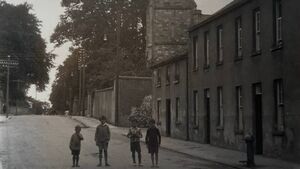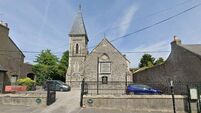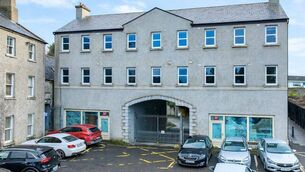Growing up on Offaly Street, Athy

Offaly Street, Athy
OFFALY Street was a vibrant family friendly street 70 years ago. Today, the same street is unrecognisable from that of its predecessor.
The families of the 1950s have died out or moved elsewhere, while the commercial heart of the street, represented by the cinema, John W. Kehoe’s pub, Kitty Webster’s and Mona Sylvester’s sweet shops, have closed.
Offaly Street today is not so much a street as a traffic route out of Athy, leading to an extended southern suburb which has developed over the years. The young families that once brought life and enjoyment to the street are no longer there.
It was in Offaly Street that I was reared and where I and my young friends and neighbours lived our lives of exploration and enquiry before entering the adult world. The families living on Offaly Street were a community even before we were able to identify ourselves as a smaller component of the larger community, which represented the entire town of Athy.
Offaly Street may well have been known as the ‘Peelers’ Street of Athy for it housed the families of three members of the local police force. Garda James Kelly and Garda Mick Tuohy lived opposite the house of my father, who was the local Garda Sergeant. Garda Johnny McMahon and Garda Mick O’Connell passed through Offaly Street on their way home to St Patrick’s Avenue.
It was a friendly street at a time when housewives were exactly that, the only wage earner generally being the male partner.
Traffic-wise, it was a very quiet street. The only local cars I recall were that of Dr Joe O’Neill and Canon McGinley, the Church of Ireland Rector.
Football was regularly played by the Offaly Street boys on the street with little or no interruption by passing traffic. We referred to ourselves as the Offaly Street gang, to differentiate ourselves from the St Patrick’s Avenue youngsters of the same age and the Leinster Street fellows.
The term gang does not indicate any criminal background and indeed, the only activity that could be questionable was the summertime orchard robberies in which we indulged. Mona Sylvester’s orchard at the top of Butler’s Row was our principal target. I have recounted previously the occasion when my younger brother Seamus was caught by Mona as he was unable to clear the orchard wall while his friends scrambled to safety.
Mona held him by the collar and walked him down Butler’s Row to 5 Offaly Street to confront my mother with the apple thief.
It was a very lucky day for Seamus, for our Aunt Mary from County Mayo had just arrived for a short visit, and whatever punishment might have been expected never materialised.
Friendships forged in my young days brought a lifelong friendship with Teddy Kelly, my best friend in those years.
Mylie Cash, Basil and Andrew White, Leopold Kelly, Willie Moore and Tom Webster were all part of the Offaly Street gang with Leopold, who was later ordained a priest for the American Diocese, as the leader.
He was a wonderful sportsman, and I had the opportunity to serve his last Mass in the Dominican Church a very short time before he died. All but Willie Moore and I have passed on, and while Willie and I have health issues, I expect to join my long departed young friends before too long.
Our favourite playground was the People's Park donated in the 1840s by the Duke of Leinster to the people of Athy. We were lords of the manor insofar as the park was concerned and, under the leadership of Leopold Kelly, we once built a wooden hut in the park. It lasted two or three days before the Duke of Leinster had it removed.
The grass in the park was cut once a year and the grass left on the ground for a few days provided one of the highlights of our time in the park. It was a simple life, but an enjoyable one.
One of our great pleasures was to attend matinees in the local cinema, which was managed by Bob Webster, who lived at the top of Offaly Street. Bob was the nearest to an upper-class person living in our humble street. This was, I believe, because he was regularly visited by the parish priest, Fr McDonnell, whose car parked outside Bob’s house told of his arrival.
The Rev. Father did not visit any other household in Offaly Street. Bob Webster was once subjected to stone throwing by our gang as he walked by the unfinished building site at the end of Offaly Street and he banned us, the Offaly gang, from attending future matinees.
It was a desperate time for us as we enjoyed sitting in the ‘God’s’ to watch the latest film release. The ban continued for some time until we decided to make an apology for the attack. We got back to the matinees again, where Mattie Brennan always gave us a bench seat in front of the screen.
Offaly Street housed several people whose important pasts I was not aware of until they had passed away.
My next-door neighbour, Joe Murphy, a worker on the railway, was an old IRA man. Garda Mick Tuohy, whose involvement with the old IRA in County Clare, was another man whose story I did not get.
Garda James Kelly, a member of a County Mayo old IRA regiment, had, like many other IRA members, joined the gardaí on the establishment of the Free State.
Paddy Garrett, a resident of number 1 Offaly Street was, like John Murphy in Number 4, a great footballer who won championship medals with Athy. Their stories were many I missed during my young days while living in Offaly Street. Goodbye Offaly Street.





